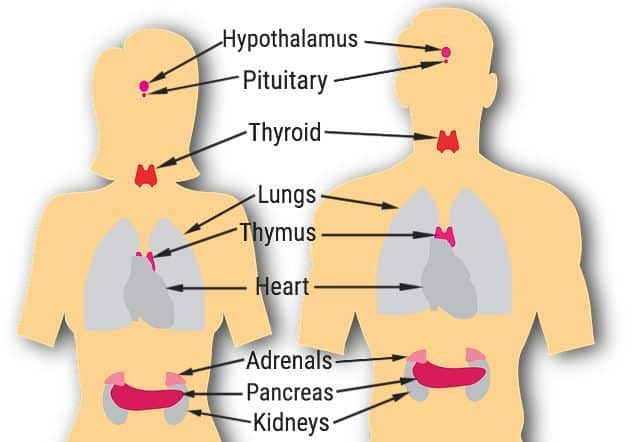Thyroid Problems and Weight Gain
The Thyroid Gland
Hormones play a major role in determining how our bodies will function and how we are going to look. Although insulin and cortisol affect our metabolism, the thyroid plays the most significant role in influencing our metabolism.
How the Thyroid Works

The hypothalamus might be small, but it’s the CEO of your hormonal headquarters. Nestled deep in the brain, this tiny gland is like the body’s internal spy agency, constantly scanning the hormonal landscape and sending intel to its deputy, the pituitary gland. The pituitary then acts as the middle manager, producing Thyroid Stimulating Hormone (TSH) and firing off orders to the adrenal glands perched atop your kidneys. When TSH levels are high, it’s the body’s way of saying, “Hey, thyroid! We’re running low—step it up!” High TSH means your thyroid hormones are slacking off. It’s like when your boss emails you 14 times in one day—it’s not good news.
The adrenal glands, meanwhile, are multitasking wizards, using cholesterol as the raw material to whip up hormones like cortisol, epinephrine, estrogen, progesterone, and testosterone. So yes, cholesterol is vital—it’s not the villain you’ve been led to believe. Without it, your hormones would be out of a job. Imagine trying to cook without ingredients—now imagine your hormones trying to work without cholesterol. Same energy.
Cortisol, the body’s emergency responder, is a lifesaver during stress. Got a bear chasing you? Cortisol’s there to pump you up. Digesting your lunch? Not so much—it’s on the back burner for now. High cortisol levels, though, come at a cost. Thyroid hormone takes a hit because, apparently, your body assumes escaping a bear is more important than digesting a burrito. Priorities, right?
The thyroid itself produces T4, a precursor hormone that gets converted into the active form, T3, by hardworking organs like your liver, kidneys, intestines, and lungs. Transported via thyroid-binding globulin (fancy name, important job), T4 doesn’t work alone. It needs sidekicks like selenium and iodine to join the party. Selenium, the unsung hero, pulls double duty—helping convert T4 to T3 and detoxifying mercury on the side. And where can you find selenium? In bacon, smelt, herring, scallops, and Brazil nuts. Yes, you heard that right—bacon might just save your thyroid (but maybe don’t overdo it).
Fun fact: T3 gets its name because it’s literally made up of three iodine molecules. So, every time you eat seafood or Brazil nuts, remember—you’re basically fueling a biochemical symphony where the thyroid plays lead violin. And like any great orchestra, it needs all its players in tune. 🎻
Some of the Problems That Cause Low Thyroid Hormone

Let’s break this down: if your metabolism is feeling like it’s running on dial-up speed, your T3 hormone might be taking a hit. And the culprits? Oh, they’re everywhere—like uninvited guests at a party.
First up, we’ve got polyunsaturated fats, pesticides, preservatives, and other food toxins. They crank up inflammation like your nosy neighbor cranks up the bass on Saturday nights. In response, your body churns out cortisol to calm the chaos. But here’s the twist: cortisol’s the drama queen of hormones—it hogs the spotlight and sidelines your thyroid hormones. The result? Your metabolism hits the brakes instead of the gas.
Next, nutrient deficiencies play spoiler. Your body’s got a shopping list for T3 production: selenium, B vitamins, vitamin D, vitamin A, iodine, omega-3s, and zinc. Miss one of these, and your thyroid’s like, “Sorry, can’t complete the order.” It’s like trying to bake a cake without eggs—possible, but something’s gonna feel off.
Now, globulin—the transport truck for thyroid hormones—has its own set of roadblocks. Fluoride and chlorine in your water? Traffic jams. Bromide in your flour? A flat tire. Add to this mix pesticides, commercially produced meat, vaccines, synthetic hormones (hello, birth control pills), and xenoestrogens from soy, and suddenly, globulin’s struggling to deliver T4 to the organs that convert it to T3. It’s like a bad Uber driver getting lost on the way to your house. And don’t even get me started on phytoestrogens in processed food—soybeans are cheap fillers, sure, but they’re also freeloaders messing with your thyroid.
Then there’s the synthetic estrogen lookalikes like BPA, PCBs, and phthalates. These sneaky saboteurs are everywhere—your shower curtain, nail polish, plastic bags, receipts… even your beloved rubber ducky isn’t innocent. These chemicals play hormonal dress-up and leave your T3 wondering who’s who in the endocrine zoo.
Speaking of troublemakers, the top seven foods causing inflammation—corn, soy, dairy, sugar, peanuts, eggs, and gluten—deserve a special callout. Gluten, in particular, is the overachiever of destruction, wreaking havoc on your gut like it’s auditioning for a disaster movie. It hides in everything from bread to beer, just waiting to make your thyroid’s life harder.
Finally, there’s your allostatic load—the total stress burden your body carries. Mental stress, toxins, infections, pathogens—it’s like carrying a backpack filled with bricks while running uphill. The result? More inflammation, higher cortisol, and lower T3. Your metabolism doesn’t stand a chance.
Moral of the story? Your thyroid’s got a lot of frenemies out there, and managing them is like trying to win a game of hormonal whack-a-mole. So, maybe give your body a break—and, for goodness’ sake, retire that rubber ducky.
Symptoms of Low Thyroid

- Sluggishness in the morning
- Poor concentration and memory
- Low-grade depression
- Dry skin
- Hoarse voice
- Thinning hair
- Coarse hair
- Being very sensitive to cold and having cold hands and feet
- Low body temperature
- Muscle pain
- Weakness or cramps
- Low sex drive
- Fluid retention
- High cholesterol
Fixing Low Thyroid

Let’s talk detox—no, not the Hollywood juice cleanse kind, but the kind that helps your body keep its internal systems from feeling like a worn-out engine. Step one: avoid toxins, addictions, and allergens. Sounds simple, but toxins are sneaky. Pesticides and preservatives? They’re hiding in your food like uninvited guests at a barbecue. Mercury? Oh, it loves bigger fish like tuna—so maybe rethink that sushi binge. And don’t forget your water; chlorinated or fluoridated water might be doing your thyroid dirty. Best practice? Go organic with your food and filter your water with a reverse osmosis filter. Or if you’re feeling low-tech, just leave a pitcher of water out overnight—the chlorine will ghost you (evaporate).
Now, stress. Chronic stress is basically cortisol’s “let’s party” invitation, which unfortunately sidelines thyroid hormones. You’ve got to kick those stressors to the curb. Whether it’s yoga, meditation, or just locking yourself in a quiet room away from your kids for ten minutes, it’s worth it. And here’s a gem from Dr. Mark Hyman: if your adrenal glands are burnt out, diving straight into thyroid treatments without addressing your adrenal glands first can backfire. It’s like trying to run a marathon on a sprained ankle—just… don’t. “Support the adrenal glands through relaxation and adaptogenic herbs (such as ginseng, rhodiola, or Siberian ginseng).” (Dr. Mark Hyman)
Exercise? It’s not just about looking good in your gym selfies. It’s a stress reliever and thyroid hormone booster all in one. So, let’s chat: hot yoga or sauna? Both make you sweat, both relax you, and both give you the satisfaction of saying, “I’m working out,” even if you’re mostly just sitting there melting.
As for nutrients, your thyroid has a wish list: selenium, iodine, zinc, vitamins A and D, and omega-3s. Feed it well. But let’s keep it real: if your thyroid is giving you serious attitude, you might need medication. Synthroid is a synthetic T4 replacement—it’s like the vanilla option. Then there’s Armour thyroid, the deluxe combo meal with T4, T3, and T2. Some doctors might still think Armour is unstable, but that’s an outdated myth. It’s more stable now than your last relationship.
And here’s the kicker for weight loss: as you lose fat, pesticides stored in those fat cells get released. Yeah, your body’s like, “Congrats, but here’s some toxic baggage to deal with.” The solution? Sweat it out. Literally. Whether it’s hot yoga or a sauna session, both detox your system and double as a mini-vacation from your inbox.
In short, your thyroid isn’t just a gland—it’s a diva that needs the right food, less stress, and occasionally, a bit of extra medical TLC. Treat it right, and it’ll stop throwing tantrums.
“Sometimes, once all the factors that disturbed your thyroid function have been corrected, you may be able to reduce or discontinue the dose. As with any treatment, always work with a physician experienced in using medications to treat your thyroid.” (Dr. Mark Hyman)
I wish you lots of health, love and happiness!
Travis Wade
The only holistic personal trainer in Edmonton.
Want To Get Started On A New Lifstyle Right Away?
Or
Would You Like A Plan To Achieve Your Fitness Goals?
Sign Up For Online Personal Training!



